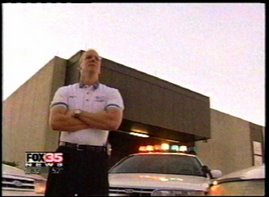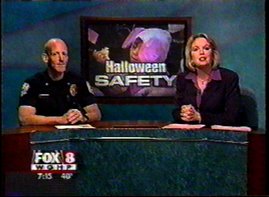My live in-studio news interview on WOFL Fox 35 News "Good Day" on the recent spate of police officer involved shootings.
Monday, November 29, 2010
News Interview on Officer Involved Police Shootings News Interview 11/29/10 Dr. Richard We...
Thursday, November 18, 2010
Does Size Matter? Small Agencies: The Cop Career Gatekeepers - PoliceLink
My latest article on PoliceLink.com on Small Agencies and Police Careers: Does Size Matter? Small Agencies: The Cop Career Gatekeepers - PoliceLink
Wednesday, November 17, 2010
Full Body Scanners Bad for America News Interview
As seen in the below two videos of an interview I did this afternoon with Central Florida News 13 reporter Jacqueline Fell in the station's downtown Orlando conference room, I do not believe that body scanners (as used by the courthouses and particularly by the TSA at airports) and other efforts to enhance the safety of the American people is the way to go.
Not only did Centrral Florida News 13 put the print and video version of the TV news package on my objection to body scanners up on their website ( http://www.cfnews13.com/article/news/2010/november/174083/Questions-continue-to-surround-body-scans - click on SCANNED IMAGES RELEASED FOR VIDEO OF NEWS REPORT ), they also put video of my raw interview on their website: http://www.cfnews13.com/video?clip=http://static.cfnews13.com/newsvideo/cfn/1117BodyScan_111720100546.flv
Tuesday, May 11, 2010
Tasering Sports Fans
Few are those who have not seen the now infamous video of a 17-year-old running on the Philadelphia Phillies ball field and being the recipient of a Philadephia Police officer's well-executed Taser shot. And many have become acquainted with the incident of the man that became disorderly and belligerent while Tiger Woods golfed away in Florida. Yesterday, I did a live via satellite interview with MSNBC anchor Tamron Hall on Taser and sports fans. As a former police chief, Taser instructor, and long-time law enforcement issues media commentator, MSNBC asked me on Sunday if I would appear on the Monday afternoon segment.
The segment had originally been slated to be six minutes or so, but was cut back due to the news surrounding President Obama's United States Supreme Court nomination announcement. I was unable to make a few of points given the time crunch. They also did not air a you tube clip of me being Tasered during training in 2004 that clearly demonstrates that you can be Tasered and walk away (like I did). But, alas, time did not permit. That's understandable as that is the nature of the TV news biz.
Also appearing was Petra DeJesus, a commissioner on the San Fransisco Police Commission. Ms. DeJesus, a civilian lawyer, was appointed to serve on the political commission. Ms. DeJesus is a vocal critic of the Taser and I believe that she is throwing the baby out with the bath water.
While Amnesty International, a great organization whose work I admire, and Ms. DeJesus trumpet deaths attributed to the Taser, they misunderstand the facts and ignore the greater good that Taser has done. I do agree that, much like a firearm or pepperspray, Taser is a tool that can be misused. But when we have bad shoots with a firearm, we do not propose getting rid of the police use of a side arm. Rather, we correctly deal with the individual officer's misconduct.
In the interview, I pointed out that many studies, including a fairly recent one by the U.S. Justice Department, have shown that the Taser is relatively safe. What I did not have time to go into in the interview is the deterrent effect that the red laser dot on the suspect's chest has. As I have stated in HLN Headline News and other media interviews in the past: the best fight for law enforcement to be in is the one that doesn't happen.
Most police officers and deputy sheriffs have seen resistant subjects give up when that red laser dot hits their chest. While they do not fear the firearm as they know it will not be used except in extreme, deadly force situation, they also know that the officer may fire that Taser.
As I opened up the segment, I answered Tamron's question by pointing out that I do not always take the position of the police. I examine each incident on its own merits, based on the information presented, and render an expert analysis. I told Tamron and the viewers that the two incidents at issue: the Philadelphia Phillies and Tiger Woods golf occurrences, appear to be proper uses of the Taser. Philadelphia Police Commissioner Charles Ramsey, former deputy superintendent of the Chicago Police and former Chief of the Washington, DC, Metropolitan Police, had already come out publicly saying that the use of the Taser was within departmental policy guidelines.
I pointed out that if someone were to come in to the Iron Man 2 movie that I saw this weekend and was loud, security would ask him to quiet down. I then took it further through the steps of law enforcement asking him to quiet down, then to leave, then to submit to the arrest that he resisted. The Tiger Woods golf guy was arrested for disorderly intoxication and resisting arrest.
Ms. DeJesus opined that Taser is too large a step to take for someone being disruptive and resisting arrest. I explained in the segment that whether the person is dangerous or not is not known. Law enforcement officers cannot read minds and we do not know what someone's intent is before they make an overt act to demonstrate their purpose.
I mentioned the case of Kansas City Royals first base coach Tom Gamboa who in 2002 lost the hearing in his right ear after two fans attacked him on the ball field. During the attack, a knife even fell out of one of the attacker's pocket. MSNBC host Tamron Hall jumped in agreeing and reminded Ms. DeJesus of the Monica Seles attack.
I said that the police are not mind readers. We do not know what people do before they do it. We in law enforcement can only deal with what we know at the time that we know it. We did not know that the 17-year-old young man who rushed onto the Phillies-Cardinal game field what his intent was. As has been demonstrated by Columbine and other events, teenagers can be dangerous too. That is especially true in the time that we live in.
Getting onto a ball field is not a matter of just stumbling a few steps. One has to overcome physical barriers and other security measures to make a conscious effort to enter the controlled and restricted space. The young man in this incident was charged with defiant trespass.
As for the incident at Tiger Wood's golf outing in Florida, I did not have the time to explain that St. Johns County deputy sheriffs only ended up Tasering the golf fan after security and then law enforcement had asked him to 1) stop, 2) leave, and 3) not resist arrest. The man was charged with disorderly intoxication and resisting arrest. I guess Ms. DeJesus and her ilk would rather that he be beaten into submission with a baton which is sure to cause broken bones and possibly serious injury or death. People forget that that is how it used to be done and the results were not pretty.
Ms. DeJesus in the segment thought that law enforcers should be able to just "muscle" people into compliance. As I mentioned in the interview, there is no magic bullet. Law enforcement officers can't just put their fingers on someone and put them out a la Mr. Spock of Star Trek fame.
I did not have time to point out is that San Francisco's own newly minted star police chief, George Gascon, tried to get his city to approve his drafting of a tightly controlled Taser policy. Interestingly, Ms. DeJesus' own commission voted narrowly four to three to turn down Chief Gascon's request.
Chief Gascon, by the way, is no slouch when it comes to law enforcement expertise. A lawyer himself, Chief Gascon came to San Francisco from his post as chief of the Mesa Police in Arizona. Prior to that, he served with the Los Angeles Police Department rising to the position of Assistant Police Chief and Director of Field Operations under the legendary Chief Bill Bratton.
No mere rubber stamp of hard-line law enforcement types, not all of Chief Gascon's policies were welcomed warmly by the Mesa Police officers. That should give more credibility to his independent assessment and support of Tasers. The device is good for policing and good for the community that law enforcement serves.
San Fancisco is the only big city to not allow it's police officers the less than lethal option that the Taser affords. Other steps such as the baton have been shown to cause more injuries and deaths to officers and suspects when deployed.
What I also did not have time in the MSNBC to elaborate on is that the deaths have been time after time shown to be caused by other factors.
Not five minutes after leaving the TV studios in Columbus, OH, I received an email on my iPhone from a person who thought I was a bad man for supporting the use of Tasers. I get quite a few of these well-intentioned, but ill-informed messages. Without the sender's name being mentioned here, here is the text of his email:
It's unfortunate there are people such as yourself propagating a tool that causes death to stop a 17 kid from running around a ballfield in jest. That cop is an idiot, I don't know how a moron like that could get on the police force. You know what I mean; the taser. Do you have interest in the company that makes these things? I think you may. It's disgusting that there are idiot cops that are stupid enough to use it on harmless citizens. Instaed of teaching cops how to use a taser, why don't you teach them some common sense and how not to be a vigilante? You are just as responsible, and liable for any deaths that these taser's cause, and if I were a judge I would hold you liable in any court of law for the death of anyone killed by your taser's, and pressing the use of these things.
As I mentioned above, the officers did not know the young man's intentions. I don't think it is worth the risk. If something had happened, than folks would be saying why didn't the police do something or do something different. It's a damned if you do and damned if you don't situation.
And, no, I am not in any way compensated nor do I have any financial interest in Taser International, the makers of Taser. Remember, I am not a proponent of the Taser in every situation. The device, however, is a good tool and needs to be available for appropriate and professional use.
Some things that uninformed people, such as Ms. DeJesus and the email sender, are missing in the Taser debate:
- Officer and Suspect injuries and deaths have gone down
- Use of Force incidents have gone down
- The police deal with some people who have risk factors exacerbated since they tend not to have adequate preventative and diagnostic health care
- The police also tend to deal with some people who have ingested drugs such as cocaine and meth.
- Physical confrontations with the police are stressful events in and of themselves. Use of the baton and other physical and mechanical means actually prolongs and intensifies the stressful situation.
- The public overwelmingly in media run polls vote that the use of the Taser is appropriate.
- The public and media overreact and do not understand how the Taser works.
Most coroners have found that deaths come from the above contributory factors. While I fully agree that some Taser usage incidents have been wrong, and I am vocal in my rectifying of those situations, not all Tasers should be eliminated.
In general, the Taser is a useful tool on an officer's tool belt. The key is proper and professional policy formulation, training, supervision, and deployment. Used appropriately, the Taser is the closest thing we have today to Star Trek's stun phaser.
Sunday, May 2, 2010
Times Square Bomb & Arizona Immigration: Balancing Policing in A Democratic Society

Many Americans woke up this morning (Sunday) to the news that a bombing situation had been thwarted in a high profile hub of our nation: New York City's Times Square. They also awoke to see pictures of hundreds of thousands of people participating in rallies protesting the Immigration law (and it's slightly altered current incarnation) in Arizona. As a former deputy sheriff who worked on the border (as pictured above) and a former police chief, I see that both deal with ideas that go the very heart of who we are as a people and what ideals our country stands for.
DICTATORSHIP POLICING EASY
It is easy to police in a dictatorship. Sadam Hussein was able to keep murderous, warring factions of Iraq in check by being more murderous than those groups. At the other end of the spectrum, The anarchy that is Somalia has no central government or ability to speak of to keep the various local warlords in check.
The United States has long struggled with governmental control and it's most visible component is that of law enforcement. Policing in a democratic society is hard as is evidenced by the events of the past few days in Times Square and in Arizona.
In general, I do not believe that we should sacrifice our ideals in order to be safer. In the words of U2 lead singer Bono (I know he is not the biggest philosopher around, but his thought here is true): "We do not need to become a monster, in order to defeat a monster."
ALERTNESS
What saved the day in New York City was the vigilance of a civilian street vendor. This veteran took a moment to notice an unusual situation and reported to a mounted New York City Police officer. The officer in turned notified his chain of command and the NYPD Bomb Squad and NYC FBI field office bomb techs responded. The system worked there thanks to the alert observation and good law enforcement response.
In Arizona, police intervention could go too far in a situation which is really larger and more political in nature (My earlier blog post on Blogger and my interview with Alternet.org goes into more detail). If the police go with the Arizona scenario, we have started to move down the slippery slope that personified our country's treatment of the Japanese during World War II., as well as the Nazis. The solution needs to come from Washington, DC, so as to preserve our localized, democratic style of policing.
Having the police pull double-duty stretches already thin resources, opens fiscally-strapped local governments up to lawsuits whether they enforce the new law or not, and will propel crimes towards non-illegals as Hispanic victims and witnesses will be intimidated and not help the police stop predators. Those predators will also victimize non-illegals. The predator illegals that are here will not be scared by this; only the non-violent illegal aliens will be wary of the law and police.
In this country, many officers have observed that people always want the laws enforced- as long as it is not against them. For example, all across the country, officers have agreed with my own experience having run radar in residential subdivisions in response to community outcry. The biggest offenders end up being the residents themselves and then they are not so happy to have that enforcement presence. Officers reading this can relate to it in their own policing experiences.
Even has a member of the police community, I have always been a staunch defender of the protections, rights, and even technicalities of our society. As I have said before, "It is those rights that protect you, me, my wife, and my son." I want a government that is strong enough to protect us, but not strong enough to move away from its democratic principles.
Much like the scales of justice, we must balance police and the power of the government enforcers in the middle. To much movement in either direction turns into the dictatorship of old Iraq or the anarchy of Somalia. We don't want to be either country. We are the United States of America and all the ideals that it stands for.
Labels: Arizona, bomb, Dictatorship, Illiegal, Immigration, NYC, police, Richard Weinblatt, Times Square
Tuesday, April 27, 2010
Arizona Illegal Immigrant Law Bad Policing

In the furor that has followed the signing of the Arizona illegal immigrant law by Governor Jan Brewer and supported by Maricopa County Sheriff Joe Arpaio (creator of the famed tent city jail and the self-proclaimed "Toughest Sheriff in America"), few have stopped to look at the effect it has on policing. In a word it is bad.
I come at this perspective after having served as a deputy sheriff in a border state - New Mexico (I am in the picture above as a patrol deputy sheriff in rural New Mexico).
First I was in Dona Ana County (a 4,000 square mile county with 50 miles along the Mexican border) and then as a Patrol Division deputy sheriff II. with the Santa Fe County Sheriff's Office (a 2,500 square mile state capital county). I also served as a police chief in North Carolina and as an educator of law enforcers. I have worked for many years providing police services for legal and illegal immigrant populations.
Above: With fellow deputy sheriff in New Mexico.
And that's the key here, folks. The police provide police services. And we provide it to all. And we do it in a challenging economic, fiscally austerity-laden governmental structure. The Arizona law sets policing back many years.
BAD COMMUNITY RELATIONS
First off, the police rely on information. If you mandate that they investigate and arrest a very vulnerable population, those folks won't come forward with information. I would have thought that in policing a democratic society, we moved beyond intimidating the victim. We want to encourage victims to come forward with information.
As a police chief in North Carolina, I had a program where I spoke in uniform at churches all around the city in an effort to reach out to the community. I stopped my unmarked Ford Crown Victoria one day at a church that served Hispanics. They scattered afraid that I would try to deport them (under the Arizona law, deportation would happen only after a possible jail sentence and fine). I convinced the pastor that I wanted to reach out to their community and that they were deserving of the police's protective service also.
I spoke that Friday night (speaking some Spanish and some translated) and started to get more and more information from the good folks in that church. First it was little nuggets of information to test if I was trustworthy. Little by little the information got bigger. It crossed into items that effected the immigrants' legal neighbors. So the issues touched all and their information helped the entire community.
If nothing else, it is important to understand that easy victims are the first step for predators. They then become emboldened to prey on the legal residents of our nation. Crime and quality of life concerns do not know borders within our communities.
RACIAL PROFILING
I respectfully disagree with Sheriff Arpaio's interpretation of the mandate to investigate and detain upon a finding of reasonable suspicion concerning legal resident status. Sheriff Arpaio says that it is not racial profiling. I disagree. Having had to compile reasonable suspicion while investigating crimes, I can see how police officers and deputy sheriffs would have no choice. Any person who appears to be of darker color with an accent would have to have those facts as part of the reasonable suspicion building blocks.
Given the current scenario, people who have some of the "building blocks" (dark skin, accent) will be stopped repeatedly and questioned. That is more akin to a police state. We should not sacrifice what has made our country great to have an appearance of action.
The reasonable suspicion part of this will be legally challenged and officers will be confused as to how they can investigate without running afoul of legal issues. This is not as simple as the public thinks and officers cannot just move from the police-person consensual encounter to reasonable suspicion on flimsy information.
BURDEN TO SYSTEM
Sheriff Arpaio and others have contended that they run white people as well through the system. I disagree with that position from several angles. We need to have discretion as to who you run through the system to check for warrants and other information.
I know some agencies and officers have departmental or personal policies that call for running every person they come in contact with. That is not always advisable or feasible. Once the arrest warrant comes through, or the officer decides to make a lower priority arrest, he or she is tied up and is unable to handle higher level calls and assist other officers. The officer has no choice and has to follow the court ordered arrest warrant or, as in this case, the mandated detention of the illegal alien. Some agencies are too busy handling 911 calls for police service to be tied up handling smaller warrants or illegal alien investigations.
VICTIMIZING THE VICTIM
Worse yet, making arrests will have a chilling effect on victims. They will be afraid to come forward. This is something that we are already battling against and the law sets us way back.
The most vulnerable of victims, women and children, will suffer the most under this law. Domestic violence investigations is one area that has truly been dealt a blow now. Few victims will have the courage or trust that they need to overcome often brutal psychological, emotional, and physical abuse.
As a uniformed patrol officer in New Mexico, I had to repeatedly assure people that I was not Immigration or the Border Patrol. That I was not interested in their status, but rather in their safety. It was hard to gain their trust. This law shatters that trust for officers with boots in the dirt trying to gain information.
In my own experience as a uniformed peace officer, I often chose not to run someone who came to me as a victim as I knew arresting them would not be in the interest of justice. If I knew of the existence of an arrest warrant, that was different. But I certainly did not go out of my way to traumatize someone who already had come forward to me as a law enforcement officer. Sometimes at great personal peril.
UNFUNDED MANDATE
This is an unfunded mandate to already fiscally strapped counties and municipalities. Arresting, charging, and jailing a person is not cheap. Law enforcement can barely keep up with what they need to do for public safety, let alone this requirement that does not give the needed dollars to make it a realistic financial picture. This law does not just call for the turning over of illegal aliens to the feds for deportation. An entire investigation and prosecution has to take place, along with the expensive jailing of the accused, which has a jail sentence and fine attached to it. Only later does the possibility of deportation come up. And the federal government may nullify this by refusing to take the person.
This law, while an attempt to keep America whole, is blatantly un-American. It undermines many of the principles that we are founded on and places the police and county sheriff's offices in an untenable position. It is at odds with our mission to gain the trust and cooperation of our democratic society. Without that trust, the most vulnerable victims, and our ideals, will suffer.
Labels: Arizona, Arpaio, Brewer, Domestic, Enforcement, Immigrant, Immigration, Law, Richard Weinblatt, Victims, Violence


































